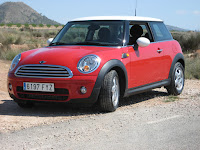
Tangible World Heritage sites, on the United Nations Educational, Social and Cultural Organization list, include places like the Taj Mahal and the Egyptian Pyramids or, in the UK, Stonehenge, Blenheim Palace, The Ironbridge Gorge and the old maritime parts of Liverpool. Spain has lots and lots of sites with forty four all together putting it third in the world ranking behind China and Italy.
But not all heritage is "bricks and mortar" - heritage also includes cultural traditions. A good British example might be pantomime although it seems, from a bit of Googling, as though the UK has not yet joined the list of countries which subscribe to the UNESCO definition of what intangible cultural heritage is. Spain has and things like the Human Towers of Catalunya, Flamenco and the Whistling Language of the island of Gomera in the Canaries are all there.
The Elche Mystery play, or in the local Valencian language el Misteri d' Elx, was given the staus of Intangible Cultural Heritage by UNESCO in 2001.
This play only takes place for a couple of days in mid August each year just before Assumption - the Christian festival which celebrates the taking of the earthly remains of Mary, mother of Jesus, to Heaven. It takes place in the basilica church in Elche and it has done so every year, without fail, for 600 years. Apparently it was a close run thing in 1632 when it took a Bapal Bull from Pope Urban VIII to exempt it from the ban on performing theatrical works in churches.
Despite Elche being just 50km from Culebrón we've never seen the play and it seemed ridiculous to let the event slip by us yet again this year. A quick check on one of the Internet ticket sites and we were in. Front row, only row, on the Puerta del Sol balcony. Just 17€. Well, on the site it was marked as a seat. In fact it was just a space, about 45cms wide, for us to lean against the rail. Nearly everyone else had seats but as recompense we had a splendid view of the action. The heat in the church was impressive. It wasn't actually that hot, maybe around 29ºC, but the humidity was incredible and looking down from above anybody and everybody was fanning themselves. A sea of hand fans in constant motion.
Although I'm on the cradle roll of the Weslyan Chapel in Elland I'm not much of a Christian but, being English and of a certain generation, Christianity came as more or less a standard extra. I know a few parables, the old version of the Lord's Prayer and I know who did what at Christmas and Easter. That didn't help me at all with this story. I didn't have a clue what was going on.
In fact the play was about as boring an event as I have ever witnessed. I don't think I was the only bored person in the audience either. Looking through the telephoto lens of my camera it was easy to spy on people playing with Facebook and WhatApp on their mobile phones. The play was all sung in an ancient form of Valencian and Latin by an all male cast. It lasted for about fifteen hours though my watch must have failed as it measured the actual performance as only lasting about two and a half hours. The watch seemed to work fine before the event, after the event and even in the intermission but during the event no. There were a couple of impressive bits when a trapdoor in the ceiling of the church opened and first one and later five people were gently lowered to the ground wearing angel wings, singing, playing harps and ukeleles (well that's what Maggie says they were though I suspect she may be jesting.) Actually at one point there were two ropes on the go with the five piece being joined by another couple of angels. It must be quite an experience to be hoisted up and down the highest part of a cathedral sized church whilst being required to sing or play an instrument.
Another good bit was that the human Mary, Mother of Jesus, Mary, was replaced by sleight of hand by the carved wooden Mary that represents Mary of the Assumption the Patron Saint of Elche. It was she who was hoisted up into the heavens amongst the harps and angel wings amidst the applause of the retreating audience who headed for the fresh air without any shouts for an encore or curtain call.
Despite it being boring, incomprehensible, sweltering and painful I am really glad I went and I would recommend it to you.












